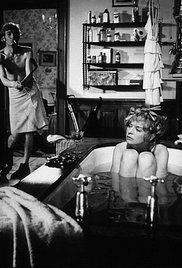
BROTHERLY LOVE
UK, 1970, 107 minutes, Colour.
Peter O' Toole, Susannah York, Michael Craig, Harry Andrews, Cyril Cusack, Judy Cornwell, Brian Blessed, Robert Urquhart, Jean Anderson, Mark Malicz.
Directed by J. Lee Thompson.
It is difficult to find an exact word that describes Brotherly Love. In its way, it is weird, it is bizarre, it is eerie in its presentation of the central characters, a Scottish brother and sister, wealthy and part of the aristocracy, who have grown up very close together, with the brother having a dependence on his sister, with overtones of incestuous desire. It is presented sometimes in a very serious way, sometimes in a comic, even frivolous, manner.
The screenplay was written by James Kennaway who then died at the age of 40. He was responsible for a number of films including Tunes of Glory, Battle of Britain. The film is based on his stage play, Country Dance, which was the title of the film in the United States.
In many ways the film is a tour de force for Peter O’ Toole, one of his more eccentric characters, finishing up at an institution (and, perhaps, reminding audiences of his 1973 role as a mad eccentric in The Ruling Class). This is a flamboyant and rather rhetorical performance, more suited to the stage than the screen. But, it is a chance to see him, still in his 30s, and to relish his style of delivery even if it is over the top.
Susannah York has a rather thankless role as his sister, bewildered by her life, trying to deal with her brother by loving him, escaping in marriage to a very sensible, Michael Craig, but always drawn back to her brother, uncontrolled in sexuality (especially with the local policeman, a very young Brian Blessed) but having to face reality, face her husband, sign the documents for her brother to go into the institution.
The film has a Scottish setting but it was filmed in Ireland. Harry Andrews is a local Brigadier, Judy Cornwell a maid who is pregnant, Jean Anderson the local matron and Cyril Cusack the doctor at the institution.
The film was directed by J Lee Thompson, who began his career with small films in England including Tiger Bay, moved to Hollywood with many blockbuster but, especially, The Guns of Navarone, finishing his career with quite a number of Charles Bronson thrillers.
1. A drama with the touch of the bizarre and the weird?
2. The title, suggestions and incest? The alternate title, Country Dance?
3. The Scottish settings, the filming in Ireland, the landscapes, the highlands, the town, the market, the central hall, the dance, the open roads? Authentic feel? The musical score?
4. The film based on a play, heavy on dialogue, the performances, the leads and the heightened performances, Peter O’ Toole and the touch of overacting? Or responding to the nature and tone of the dialogue?
5. Peter O’ Toole and his screen presence, Pink, the background of the family, the dead father, the drinking mother, Hillary and his relationship with her when they were children, as they grew up? His army service and being told he had a low moral tone? His madness? In an institution? His work on the farm, his resentment of being out in the country? His relationship with Hillary, their play together, arguments, his love for her, the final declarations? His attitude towards Doug, the touch of jealousy, ridiculing him? The conversations at the dance in the classroom? His behaviour at the dance, with the women, frantic dancing, taking the woman home? Hangover? His attitude towards Rosie and her pregnancy, giving her the job back? With the Brigadier, the discussions, taking him duck shooting? A dissolute man, touch of madness, finally going to the institution?
6. Hillary, the credibility of her marriage to Doug, wanting to get away from home, away from Pink, memories of their childhood, his attentions to her, their play? The ease with each other – as illustrated in the bath sequence? Her returning home, her own touches of madness, touches of hysteria? Erratic behaviour towards Doug, attraction towards him, sceptical about love, pushing him away? At the dance, in the classroom, the “cabaret” performances between the two? Her leaving, spending the night with the policeman, and her later disdain of him? Her having to face reality, going to the institution, the explanations by the doctor, seeing the other patients, finally signing
the documents?
7. Doug, sensible, the background of his ordinary schooling, dilligent, a farmer, at the auction, the sale of the sheep, advice to the Brigadier? The cup of tea with Hillary, coming to the dance, her behaviour, his bewilderment, yet his love? His concern for Rosie and her child? Going to the matron to advise giving custody? With the Brigadier, the duck shooting? The final confrontations with Pink and Hillary, a man who spoke the truth?
8. The Brigadier, hunting, auctions, the possibility of buying the estate, going duck shooting, the conversations with Pink, the touch of bewilderment?
9. The policeman, the parking at the dance, revelation that he was the father of Rosie’s child, Hillary going to him on the night, the sexual encounter, later disdain for him?
10. The doctor, the institution, the care for the patients, Pink spending his future at the institution?
11. The film from the 1960s – the look, cars, fashions, moral stances? As judged from later decades?